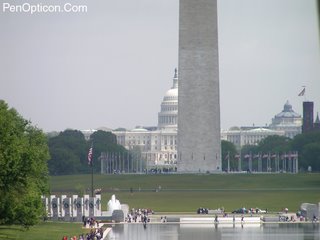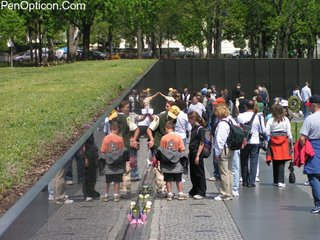 I have visited Ottawa many times, toured Parliament, sat in the Governor General's "backyard", been transfixed by the National Gallery of Canada and cycled miles of bike paths, and gardens. It's an amazing place, but compared to Washington, D.C. my capital is little more than a beaver lodge nestled at the edge of the Ottawa River. A very expensive beaver lodge, mind you. But it's all relative. "Your tax dollars at work" has a very different meaning, depending on which side of the border you happen to be from.
I have visited Ottawa many times, toured Parliament, sat in the Governor General's "backyard", been transfixed by the National Gallery of Canada and cycled miles of bike paths, and gardens. It's an amazing place, but compared to Washington, D.C. my capital is little more than a beaver lodge nestled at the edge of the Ottawa River. A very expensive beaver lodge, mind you. But it's all relative. "Your tax dollars at work" has a very different meaning, depending on which side of the border you happen to be from.
We arrived in Washington in the midst of a nasty storm, a torrential rain that was matched by the stormy events of the day: the Duke lacrosse team rape allegations, Moussaoui's trial in Alexandria and sky-rocketing gas prices (which are now *gasp* almost as high as Canadian prices). We were in the U.S. capital when we learned that four Canadians had been killed by a roadside bomb in Afghanistan and that the Harper government had decided not to fly the Canadian flag at half-mast to honor the fallen -- or allow media to bear witness to the return of their bodies. All of these things swirled in our road-weary brains while we wandered around the National Mall.
In case you Americans don't know it yet, your president now has a "Mini Me" in the form of Canada's Prime Minister: a smug, self-righteous, introverted, media-shy conservative. Harper is doing everything he can to follow in W's footsteps. His newly announced budget will build more jails (in a country with falling crime rates), while granting regressive tax relief to the wealthiest Canadians and businesses. He has manipulated Parliament to avoid contact with media. And, as already mentioned, has forbidden media coverage of the repatriation of soldiers lost in battle (sound familiar?). Our Prime Minister does not look much like W, but he sure sounds like him. Given that Bush's popularity is plummeting, it will be interesting so see if Harper's mimicry results in a similar fate. We can hope.
 But back in Washington... we are just two more foreign visitors walking around the White House, striding to the Washington Monument and then proceeding alongside the Reflecting Pool toward the Lincoln Memorial. It's all beautiful and huge and well... monumental. And when the rain finally ends, it's a gorgeous day -- there are white-throated sparrows and warblers singing in the trees around the White House. We are foreigners and yet it is all so familiar -- images embedded and deep memories inserted in the mind by a lifetime of TV and film. And books -- like Kim Stanley Robinson's Forty Signs of Rain. Familiar but still strange. The small anti-nuclear protest, the Scientology tent and the lone individual screaming incoherently at the White House (until he was quietly cornered by security personnel) felt like business as usual. When Denise looked through her binoculars back at the White House, she said the rooftop security sniper seemed to be looking right back at her.
But back in Washington... we are just two more foreign visitors walking around the White House, striding to the Washington Monument and then proceeding alongside the Reflecting Pool toward the Lincoln Memorial. It's all beautiful and huge and well... monumental. And when the rain finally ends, it's a gorgeous day -- there are white-throated sparrows and warblers singing in the trees around the White House. We are foreigners and yet it is all so familiar -- images embedded and deep memories inserted in the mind by a lifetime of TV and film. And books -- like Kim Stanley Robinson's Forty Signs of Rain. Familiar but still strange. The small anti-nuclear protest, the Scientology tent and the lone individual screaming incoherently at the White House (until he was quietly cornered by security personnel) felt like business as usual. When Denise looked through her binoculars back at the White House, she said the rooftop security sniper seemed to be looking right back at her.
And that's the point, I suppose. Supposedly we are foreigners, and yet when you consider the "fundamentals", we're not so different. Consider these two great souls that we lost last week:
John Kenneth Galbraith: A Canadian-born economist who lived and worked most of his life in the U.S. had considerable influence in shaping the discourse of American liberal politics after World War II. Even if you don't like his politics, ya gotta like his wit: The modern conservative is engaged in one of man's oldest exercises in moral philosophy; that is, the search for a superior moral justification for selfishness.
Jane Jacobs: An American-born urban thinker and activist who lived and worked much of her life in Canada. Jacob's book The Death and Life of Great American Cities got people thinking about sprawl, urban renewal and the disastrous effects of slicing up cities with expressways. She is credited with stopping both New York's Lower Manhattan Expressway and helping to prevent Toronto's Spadina Expressway from being built. Her dream of a creative, organic city was a powerful vision, though sadly, one that has seldom been realized. She tells us: There is a quality even meaner than outright ugliness or disorder, and this meaner quality is the dishonest mask of pretended order, achieved by ignoring or suppressing the real order that is struggling to exist and to be served. Unfortunately, we are surrounded by "pretended order" -- we are corralled and controlled by 6-lane arterial roads, big box stores and factory outlets.
But there it is. Two great minds lost. Jacobs, an American who lived and loved in Canada and Galbraith, a Canadian who loved and lived in America, both dreaming of a different kind of justice and an order that flowed upward from individual choice and responsibility -- not downward from greed and intangible "market forces". Eyes can meet unexpectedly in binoculars, traversing hundreds of yards at the speed of light and ideas can travel almost as fast between our countries.
 But we were not thinking of any of this in Washington when we were still climbing the steps of the Lincoln Memorial and meditating on that President's words. We spent another hour or so wandering around the Korean and Vietnam memorials. These are truly moving places, where families still quietly scan for the names of lost loved ones. A few veterans stand by and politely help out when asked. It's a place of wistful smiles and quiet tears, and for outsiders like us, who never had to come to terms with any of it, the raw emotion of the place still echoes over the names engraved on the Wall.
But we were not thinking of any of this in Washington when we were still climbing the steps of the Lincoln Memorial and meditating on that President's words. We spent another hour or so wandering around the Korean and Vietnam memorials. These are truly moving places, where families still quietly scan for the names of lost loved ones. A few veterans stand by and politely help out when asked. It's a place of wistful smiles and quiet tears, and for outsiders like us, who never had to come to terms with any of it, the raw emotion of the place still echoes over the names engraved on the Wall.
These are places of healing for bereaved families and surviving veterans and care has been taken to build them well. But it took a long time for them to be built -- a long time to jog the official public memory. The Vietnam memorial opened in Washington in 1982, a mere 7 years after that war ended in 1975. It took considerably longer for Washington to memorialize World War II in 2004 -- almost 60 years after D-Day. Perhaps nothing can or should be made of these facts. Or perhaps the need to honor the dead of a war clouded by political spin and national guilt is greater than the need to honor the fallen of a "just" war. If that is the case, then let us hope they have already mapped out a place for the Iraq War Memorial. It needs to be built now.
 I have visited
I have visited  But back in
But back in  But we were not thinking of any of this in
But we were not thinking of any of this in
No comments:
Post a Comment